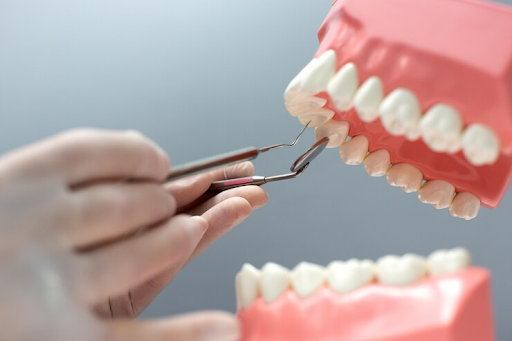An advanced dental implant is a replacement tooth resembling the original tooth’s structure. An implant such as a crown, bridge, or denture is held in place by a titanium “root” carefully placed into the bone.
Proper maintenance can last a lifetime and looks and functions like a natural tooth.
Some dentists would gladly take the time to review the process’s specifics and respond to any inquiries. Dental implants are frequently used to replace one or more lost teeth.
Let’s explore the advantages and disadvantages of dental implants compared to alternative dental procedures.
It givess a Natural look
Your tooth’s artificial root is a dental implant. Compared to other treatments like dentures, the dentist can place a crown on top of an implant that may feel more comfortable and help resemble a genuine tooth.
Dental implants exist in different sizes and forms. Your dentist will create implants that fill the space and blend in with the neighboring teeth.
Which teeth are implants will remain a secret to you and your dentist.
Restores Bite Force
Dental implants, secured with a titanium post, allow for nearly the same force as natural teeth in bites.
Because they are not secured and lay on the gums, other tooth replacement choices return less of your bite force.
Prevents bone loss
The bone loss that happens when you lose a tooth may be avoided with dental implants.
When you lose a tooth, your jawbone is no longer under tension in that area of your mouth. Your body reabsorbs and breaks down some of the bone tissue over time.
According to Trusted Source, several studies show that 30% of the alveolar ridge is gone following tooth loss. Your jawbone’s alveolar ridge is where your tooth socket is located. Bone loss is most significant over the first half-year.
No Embarrassing Slippage
Because dentures can shift or slip inside your mouth, patients with dentures occasionally experience self-consciousness when speaking, laughing, or eating in public. Because dental implants are firmly placed, you won’t ever feel self-conscious about them.
keeps adjacent teeth stable
Adjacent teeth may crookedly migrate towards the gap left by a lost tooth. This causes your teeth to become misaligned, impacting your bite, chew, and look.
It may result in interference that subsequently complicates tooth replacement. A bad bite can cause pain, headaches, and problems with your temporomandibular joint or TMJ.
Prevents facial sagging and premature ageing
One unintended consequence of bone loss brought on by tooth loss is facial drooping. The gap between the tip of the nose and the chin gradually gets less as the lower portion of the face begins to collapse.
A more pointed chin, thinning lips, and an abundance of lines around the mouth can all contribute to a person’s appearance of being much older than they are.








